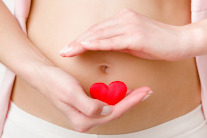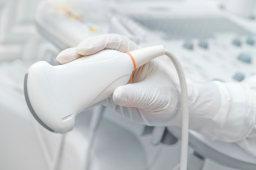4 Probable symptoms of the first month of pregnancy
Larger belly, increase in breast size and genital changes
The probable symptoms that make a woman, and her gynaecologist, suspect a possible pregnancy can appear all at once or at different times. Some women have pregnancies without symptoms, but this is uncommon.
1. Larger belly
An enlarged belly can be a probable sign of pregnancy, but it is not always the case: it could be a case of ectopic pregnancy (when the egg is implanted outside the womb). Also, in obese women, an enlarged belly may go unnoticed.
2. Genital changes: changes in shape, size and consistency
During a gynaecological check-up, some genital changes can immediately be observed in pregnant women. These are due to pregnancy hormonal changes and none of them have any effect on sexual relations:
- The cervix is softer and moves more easily.
- Also, the vaginal walls are more elastic and have a more intense colour.
- The future mother can observe a colour change in her vulva: the skin is darker, and takes on a bluish shade. Genital changes become obvious in the early stages of pregnancy.
3. Breasts: increase in size and sensitivity
Breasts become engorged and tender. They can be hypersensitive and sore upon palpation: for some women it is difficult to wear a bra. Changes in the breasts are noticeable from the first days of pregnancy. Your body is gradually getting ready to feed your baby-to-be.
Enlargement and greater sensitivity
This is one of the first signs of pregnancy in many women. You may notice great sensitivity, tingling, and even temperature changes in the area. The increase in size is due to the flood of female hormones and the accumulation of fat that occurs during the first weeks of pregnancy. By six weeks into pregnancy many women's breasts have grown a full cup size or more. However, your breasts will continue to grow until you go into labour and later, when the milk comes.
Change of colour, itching and stretch marks
The skin of the nipple and areola becomes darker and its profile more prominent. Small glands around the areolas secrete a fatty substance so that the nipple does not dry out and crack, and can perform its feeding function. Stretch marks and itchy skin from the breast growth are also common. You will also notice more bluish veins in the breast, as more blood is needed
Colostrum production
From week 12 or week 14 a pregnant woman ́s breasts may start leaking. This liquid (thicker and yellower at the beginning of the pregnancy) is the colostrum, the substance which will feed the baby in the first few days after child birth before the milk comes in. The colostrum will become lighter and almost transparent when the child is born.
4. Mood swings: irritability, wanting to cry
Severe changes of mood during pregnancy, especially in the first and third trimesters, are very similar to PMS. A woman who suffers them during her period is very likely to reproduce them during pregnancy due to the flood of hormones that come into play at this time. In a single day, the pregnant woman may go from crying to laughing several times, get angry with her partner or co-workers, notice symptoms of depression or deep sadness, etc.
It is estimated that 10% of pregnant women suffer depression during their pregnancy. If you notice exaggerated mood swings, serious trouble sleeping or changes in eating habits, such as very poor appetite or inability to stop eating, you must consult a doctor. All this interferes with the progress of a healthy pregnancy.










